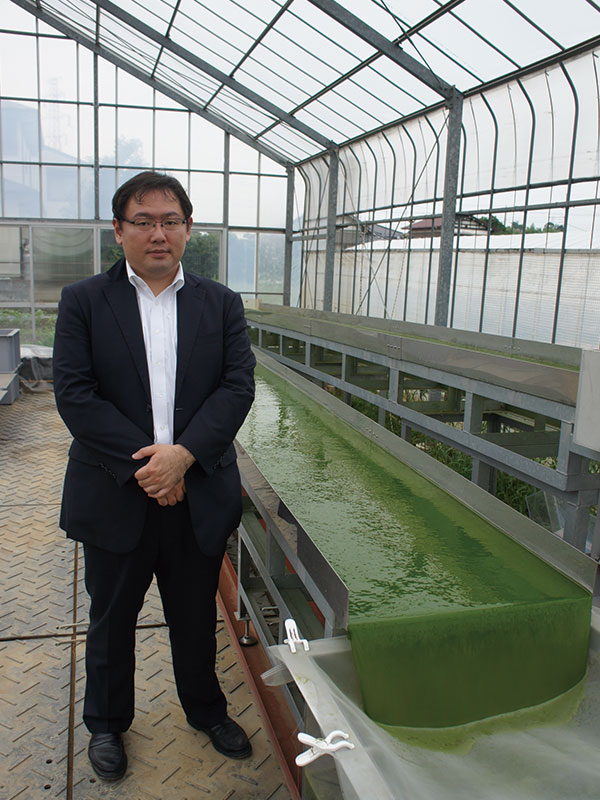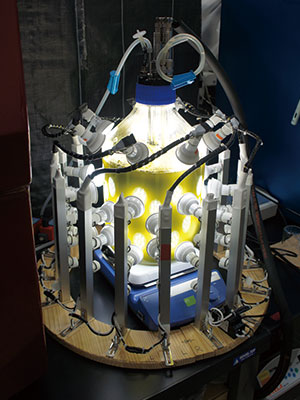A biotech venture from Kashiwa aiming to become a conglomerate dealing in algae

UTokyo 30s
Up-and-coming young entrepreneurs
Of the more than 350 University of Tokyo spin-off ventures, we have chosen to feature those by seven energetic young entrepreneurs in their 30s. Four of these companies are located in the venture support facilities on the Hongo Campus, one in the support facilities on the Kashiwa Campus, and one each in the Tokyo neighborhoods of Otemachi and Gotanda. How do these young people go about their daily work, and what kind of people are they? A few glimpses are presented here.
| Development of algae biomaterials |
A biotech venture from Kashiwa aiming to become a conglomerate dealing in algae


There are said to be hundreds of thousands of types of algae on the Earth, and it is also drawing attention for potential use as biofuel as well as food. Tsuyoshi Takeshita, President and CEO of Algal Bio Co. Ltd. is aiming to create a sogo shosha (a conglomerate company) dealing in algae. He is an expert in microalgae, which differ from larger algae such as seaweed and kelp. Before founding the company, he was involved in research on microalgae in the Graduate School of Frontier Sciences at the Kashiwa Campus.
“I majored in chemistry when I was at Chuo University, but I really wanted to do research in a field close to living things. After being introduced by a professor who had graduated from the University of Tokyo, I joined the lab of Professor Shigeyuki Kawano (now Emeritus Professor). It was at the time when Professor Kawano was starting his studies on biofuel.”
Having suffered from asthma as a child, Takeshita says he felt strongly motivated to engage in research on child-friendly clean energy.
Among algae, Takeshita studied a type of Chlorella to find out how carbon flows in cells to store oil in algae. He also selected promising types out of many different algae to develop species that are efficient as fuel, and refined techniques for large-scale culturing and mass production.
While algae can be cultured in a device known as a bioreactor, there are many issues in producing it at scale to make it an alternative to fossil fuels. Feeling the need to industrialize the university research by himself, Takeshita decided to start a business as soon as he completed his doctorate. With support from the University of Tokyo Edge Capital Partners Co., Ltd. (UTEC), Algal Bio has been conducting research and development with a staff of 11 people (as of January 2020). The company is located in Kashiwa, Chiba Prefecture, in the Tokatsu Techno Plaza and the University of Tokyo Kashiwa Venture Plaza, next to the Kashiwa Campus.
Algal Bio handles around 3,000 strains of microalgae. In addition to biofuel, there are many other promising applications, from functional foods to cosmetics. Blood-red astaxanthin, for example, is seen to have pro-aging benefits, while yellow lutein shows promise for preventing the aging of eyes. Additionally, pigments included in algae can be used as safe food additives.
“There are many different strains of algae, so we can ask companies about their needs and provide algae that are tailored to them. There are companies focused on particular algae, but I believe we are the only venture company in Japan taking advantage of the diversity of algae.”
Takeshita says his immediate goal, for the sake of developing high-quality products without any contamination, is to build closed-type bioreactors, with upright glass tubes lined up in a row, rather than the open-style plant generally found in Japan. He is determined to make a success of the Kashiwa-originating UTokyo venture.
“Chiba has a fair amount of abandoned agricultural land and unused greenhouses. I would like to contribute toward regional revitalization by installing bioreactors in such places and making effective use of them.”
| Q & A | |
|---|---|
| What will save our Earth? | “Plants and algae. I believe algae will solve environmental problems.” |
| What is your hobby? | “I’m a train nut. I’ve even been known to rent a whole train for an event.” |
| Your experience with judo led to doing research at a Czech university? | “Yes, a Czech professor who came to our lab was a judoist. He let me stay at his house.” |
| What do you feel when you look at the generations before you? | “When I hear of their achievements expanding overseas and their struggles, it strangely motivates me to work harder.” |

* This article was originally printed in Tansei 39 (Japanese language only). All information in this article is as of September 2019.



 Tsuyoshi Takeshita
Tsuyoshi Takeshita


